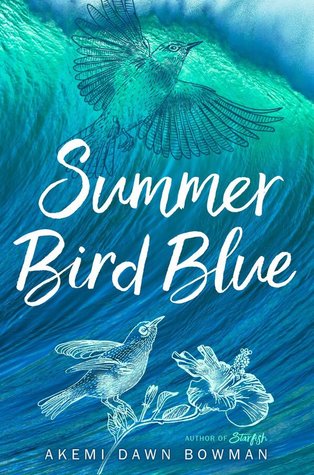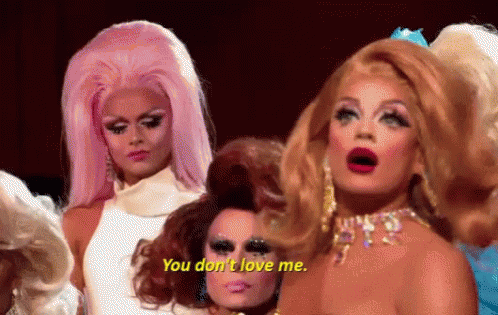Summer Bird Blue
by Akemi Dawn Bowman
Simon Pulse | September 11, 2018
Rumi Seto spends a lot of time worrying she doesn’t have the answers to everything. What to eat, where to go, whom to love. But there is one thing she is absolutely sure of—she wants to spend the rest of her life writing music with her younger sister, Lea.
Then Lea dies in a car accident, and her mother sends her away to live with her aunt in Hawaii while she deals with her own grief. Now thousands of miles from home, Rumi struggles to navigate the loss of her sister, being abandoned by her mother, and the absence of music in her life. With the help of the “boys next door”—a teenage surfer named Kai, who smiles too much and doesn’t take anything seriously, and an eighty-year-old named George Watanabe, who succumbed to his own grief years ago—Rumi attempts to find her way back to her music, to write the song she and Lea never had the chance to finish.
Starfish was one of my favorite books in 2017 because of how emotional and relatable it was; Kiko's journey as an Asian American who struggled to love herself moved me to tears multiple times-I'm emotional just thinking about it. Because I loved Starfish so much, I was hesitant to read Summer Bird Blue, it's unfair to approach it with such demanding expectations, near god-like! Nonetheless, I went into this story blind, I forgot what the synopsis said, and I went in with an open mind. I was hooked on the first page.
Akemi Dawn Bowman... her writing has me at a loss of words. I look at it, mouth agape, looking stupid in awe, such a fantastic writer. From the first page, the characters come alive. The dynamic is quickly established: Rumi loves and has a close relationship with her younger sister Lea; Lea is a ball of sunshine, rainbows, and glitter that gets along with everyone and everyone loves her; Rumi has a strained relationship with her mom. The author paints the characters realistically and humanly (no, I don't mean humanely, Grammarly.) Rumi and Lea may be close sisters and love each other dearly, but they are also sisters that fight; she does a great job painting the highs and lows of sisterhood. But, I think her writing on the bond between a mother and her child/children truly shines, which I also saw in Starfish. When I read it, it elicited a physical reaction: it felt like someone punched my heart and the shockwaves were traveling through my body.
Rumi and her mother have a rocky relationship. When Lea was alive, their mother would try to join in their conversation and be a part of their life, as mothers do, but Rumi brushes her off and acts cold towards her; this is because their mother is a single mother that works hard to support them, she does not have the most time to spend with them. This strengthens Rumi and Lea's relationship and "damages" Rumi's relationship with her mom. Rumi believes that her mother favors Lea because they get along better, but here she is kicking her mother to the curb! Also, Rumi is very possessive of Lea. Rumi at her mother:
After the accident, Rumi is sent to Hawaii to live with her aunt while her mother processes her own grief. Her inner-dialogue about her grief over her sister's death and her anger towards her mother's abandonment during her time of need is overwhelming: her pain demanded to be felt. It was hard to read because it was pure, raw emotion, but it felt so cathartic to read because everything she wants to say is unleashed. The author also implements music as an emotional outlet. Um, it's pretty? I thought it was healthy to transform something negative into something positive. I am thankful for the outlet because it stopped her from projecting her anger at everyone; I found her rude unlikable because of this—I know she's going through things, so I can "forgive" her—but I enjoyed her character more towards the end of the story/acceptance.
I LOVE the fact that the author set the story in Hawaii and used Pidgin! Hawaii is the perfect place for this story: the people, the mindset, the food, and the landscape help Rumi process her grief and enrich the story. The book also has Asian/Pacific Islander and LGBTQ+ representation. 10/10 would recommend.
Rumi and her mother have a rocky relationship. When Lea was alive, their mother would try to join in their conversation and be a part of their life, as mothers do, but Rumi brushes her off and acts cold towards her; this is because their mother is a single mother that works hard to support them, she does not have the most time to spend with them. This strengthens Rumi and Lea's relationship and "damages" Rumi's relationship with her mom. Rumi believes that her mother favors Lea because they get along better, but here she is kicking her mother to the curb! Also, Rumi is very possessive of Lea. Rumi at her mother:
I LOVE the fact that the author set the story in Hawaii and used Pidgin! Hawaii is the perfect place for this story: the people, the mindset, the food, and the landscape help Rumi process her grief and enrich the story. The book also has Asian/Pacific Islander and LGBTQ+ representation. 10/10 would recommend.




I keep scrolling back up to look at the cover again lol!
ReplyDeleteLOL it is a nice cover!
DeleteIt's brilliant to see a book with great Pacific Islander representation, we need more in books especially Maori and Polynesian characters. I haven't read Starfish but have heard nothing but wonderful things about that one and this sounds no different. Such a remarkable, well written read. I'll have to grab a copy and soon! Brilliant review Vivien, thanks for putting this on my radar!
ReplyDeleteI can't wait to hear your thought on Starfish and Summer Bird Blue. She has a new book coming out soon called Harley in the Sky. I bet it's going to be amazing!
DeleteTotally conceed that Grammarly is impresive, but my co-workers still feel like the suggestions themselves are rules-based. I confirmed this when I stumbled on the artificial intelligence editor named INK for All:http://bit.ly/2IiHXlQ.
ReplyDelete